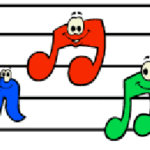 Children with delayed speech development are at risk of acquiring other cognitive (reasoning), social-emotional, and school-related problems.
Children with delayed speech development are at risk of acquiring other cognitive (reasoning), social-emotional, and school-related problems.
Researchers in Germany studied the effects of music therapy in these children.
First, the details.
- 18 children with delayed speech development were assigned to a treatment group.
- Individualized music therapy
- No treatment Individual music therapy
- All participants received each treatment twice, with an interval of about 8 weeks between treatments.
- Before and after each period, a speech development test, a non-verbal intelligence test for children, and music therapy assessment scales were used to evaluate speech development.
And, the results.
- There was positive development after receiving music therapy.
- Both phonological capacity (sounds of speech) and the children’s understanding of speech increased under treatment.
- There was also improvement in cognitive structures, action patterns, and level of intelligence.
- The children, according to the Nordoff-Robbins scales, showed clinically significant changes in client-therapist relationship and communication.
The bottom line?
The authors concluded, “Music therapy may have a measurable effect on the speech development of children through the treatment’s interactions with fundamental aspects of speech development, including the ability to form and maintain relationships and prosodic [intonation, pitch, rate, loudness, rhythm, etc] abilities.”
It’s a small study, but the results suggest that music may have a complementary role in the treatment of children with delayed speech development.
7/29/10 11:30 JR